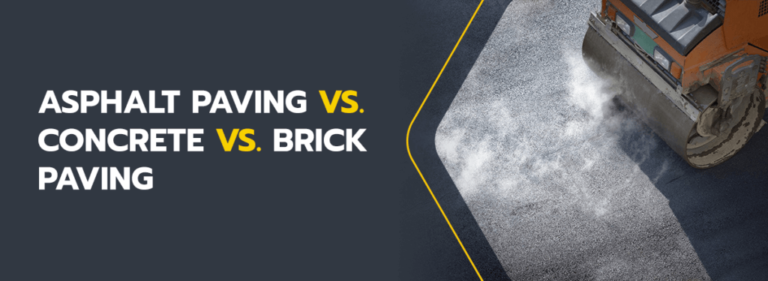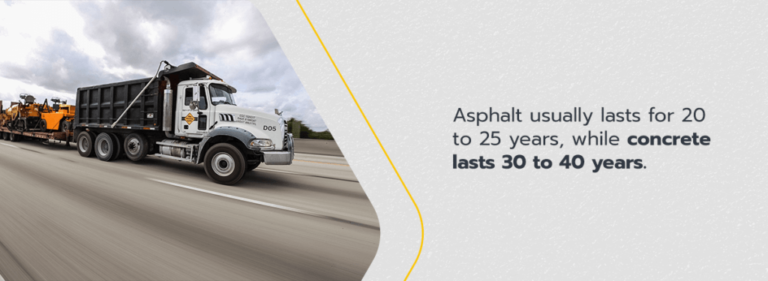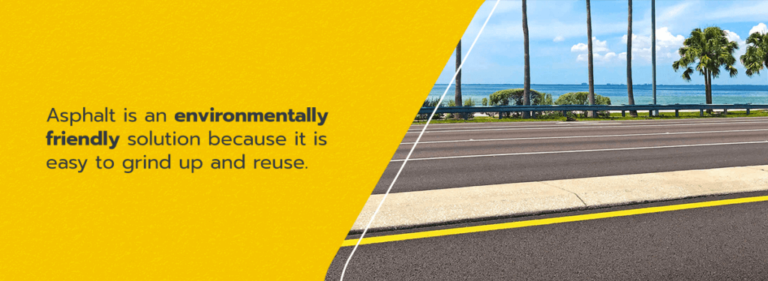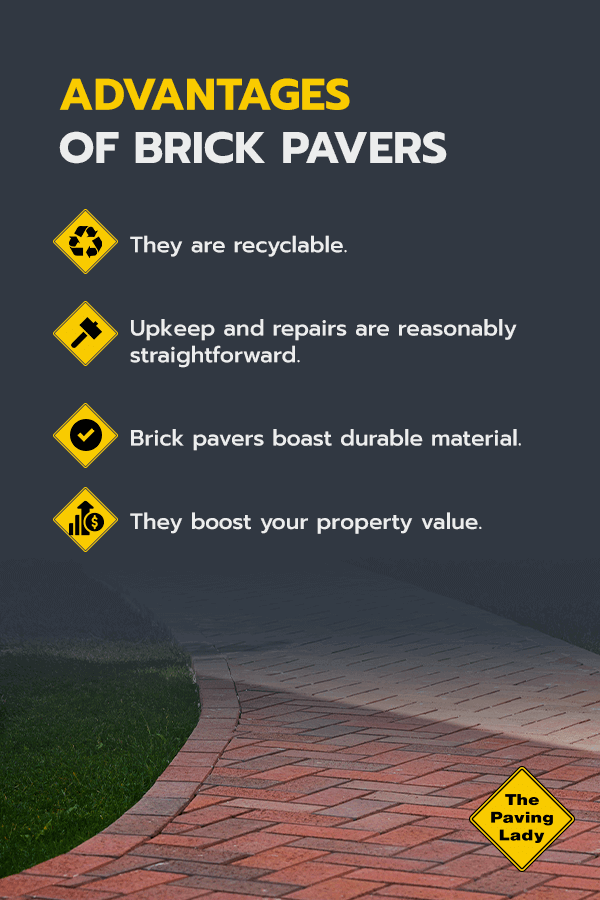
Nobody enjoys driving on a rough road or parking lot beset with multiple potholes and other cracks in the ground. These issues may signal it is time for a new paving job at your property. Let’s look at some of the most popular materials that you can use for your next paving project and the advantages of each.
Asphalt Pavement vs. Concrete Pavement
Asphalt and concrete are two popular pavement choices. Choosing which material you will use is one of the first decisions you must make when choosing to pave an area on your commercial or public property, such as a parking lot, parking garage, sidewalk, highway or back road. No matter what the paving project is, this decision-making step is crucial, and you’ll want to consider a few different factors when making your choice.
Climate
Be aware of the climate in your project’s location. If you are in a traditionally colder climate, you must take some extra caution with concrete. In cold weather, concrete may be vulnerable to frost heaves, expansion and contraction, which can cause deterioration. Also, if your project is in a colder region that experiences snow, you might have to put down salt to prevent slips, which is another reason you may want to be cautious with concrete paving. Concrete can be susceptible to deterioration from salt. A benefit of asphalt pavement is that it is impervious to cold weather or salt use.
From a climate perspective, asphalt may perform better in colder weather, but you must take further considerations with asphalt in warmer temperatures. If asphalt pavement overheats, it can soften and become oily. Concrete does not heat up as fast in these types of temperatures.
Maintenance, Repairs and Longevity
After the asphalt or concrete paving project concludes, you will want to know what to expect with ongoing upkeep and maintenance. Every location is different, but here are a few estimates and averages to expect from your paving job.
- Asphalt requires resealing six months after the initial installation and then resealing every three to five years after that.
- Concrete does not require resealing, but if you choose to get it resealed after every five years, it can prolong your concrete’s lifespan.
- Concrete repairs typically cost more on average than asphalt repairs, but the average longevity may make up for the disparity in repair costs. Asphalt usually lasts for 20 to 25 years, while concrete lasts 30 to 40 years.

Drying Time
You can drive on asphalt paving almost immediately or within 24 hours of the asphalt project’s completion. Concrete requires about a week to cure before cars or pedestrians can access the newly paved road, sidewalk or parking lot.
How to Make Asphalt and Concrete
Asphalt consists of a mixture of binder, filler and aggregates. Aggregates are processed mineral materials, including rock, sand, gravel or a combination of recycled materials. The binder’s function is to unite the aggregates and form a cohesive mixture. Bitumen is a common material used as a binder.
Concrete consists of a mixture of cement, air, water, sand and gravel. The typical mix is about 10% cement, 20% air and water, 30% sand and 40% gravel. Depending on the project, we may recommend using one of five types of cement. For example, Type I cement is the concrete mixture used in most residential projects, and Type III is best for situations where there is a risk of freezing temperatures.
Now that you know the difference between asphalt vs. concrete roads, let’s review each material’s benefits.
Advantages of Asphalt Paving
Asphalt paving brings the following notable benefits.
- It does not require much drying time, and you can drive on it almost immediately.
- It can last 20 to 25 years with proper maintenance.
- It can hide oil stains on the surface.
- It does not crack easily in freezing conditions.
- Asphalt does not get damaged with salt or de-icer applications in the winter months.
- Asphalt is an environmentally friendly solution because it is easy to grind up and reuse.

Advantages of Concrete Paving
Why might you choose concrete vs. asphalt roads? Consider these benefits.
- Concrete does not soften or become oily in extreme heat conditions.
- It reflects sunlight and streetlamps due to its lighter color.
- Concrete paving is durable enough to withstand the weight of many heavy objects, including vehicles.
Concrete vs. Brick Pavers
Should you get brick or concrete? Unlike paving with asphalt or concrete slabs, pavers do not require any pouring. Instead, they arrive dry and ready to install. Two types of concrete pavers you could use are interlocking pavers and architectural pavers. Architectural concrete pavers are thinner and usually better for interior flooring or landscaping, while interlocking concrete pavers may be better for applications like parking pads because they are thick and sturdy. Interlocking pavers are a type of permeable paving. They help prevent and eliminate rainwater runoff by having extra-wide joints or drain holes that help water flow directly into the soil.
Advantages of Concrete Pavers
Why might you want to install concrete pavers?
- They may be stronger than poured concrete.
- You can replace individual concrete pavers.
- They offer good traction when wet, offering enhanced safety, especially on steep hills.
- Maintenance is straightforward. If one of the pavers crack, you can fix it and replace it.
One remarkable advantage of concrete pavers is that they can handle more weight than poured concrete. These pavers withstand 8,000 pounds per square inch of pressure, compared to poured concrete’s ability to withstand about 3,000 pounds per square inch of pressure.
Advantages of Brick Pavers
Manufacturing brick pavers involves casting clay into forms and then heat-curing the material, usually in a rectangle. These brick pavers are versatile, as they could give your private or commercial property a more modern appearance. Here are some additional benefits of brick pavers.
- They are recyclable.
- Upkeep and repairs are reasonably straightforward.
- Brick pavers boast durable material.
- They boost your property value.

As mentioned, brick paver maintenance is simple and can extend your paving project’s longevity. With proper upkeep, brick pavers could last 25 years or more. One way to maintain them is to wash your paved location with a pressure washer once or twice per year. When doing so, you will want to make sure to remove any weeds or dirt from between the bricks. After the surface has dried, have the bricks sealed after each washing. The significance of this critical step is to solidify the sand and help prevent unwanted elements like weeds and moss from appearing within the joints.
Asphalt, Concrete and Paver Considerations for Commercial Regulations
Commercial paving projects must meet specific requirements that differ compared to a residential paving job. For example, all commercial parking lots should drain a particular amount of water per hour to ensure they can handle the maximum level of rainfall that might occur.
To meet commercial road, parking lot or other types of land paving specifications, you should consult with a concrete and asphalt paving company that understands these regulations and has experience navigating them.
Get a Custom Paving Consultation to Determine the Best Road Paving Material for You
If you are still trying to decide what material would be best for your next paving job, turn to The Paving Lady for your free custom consultation and let us guide you through what needs to happen to complete your paving project without any hiccups. As you now know, asphalt, concrete and pavers all bring various advantages to the table. It takes a trusted crew like The Paving Lady team to guide you and complete your paving project with the best solution for the job.
We’ve been serving South Florida since 1985, and our experienced team of professionals will give you the best solutions to preserve your investment and enhance your property’s overall appearance. We serve various establishments, including schools, municipal areas, new construction, HOAs, condos and apartments. Reach out to us today for your asphalt or concrete pavement project consultation. When you choose The Paving Lady as your pavement partner, you will see our No. 1 goal is to exceed our customers’ expectations with impeccable responsiveness, reliability and service.
Call 561-572-2600 or submit our online contact form to learn more about our custom paving services or to request a free estimate for the cost of your asphalt or concrete paving.

